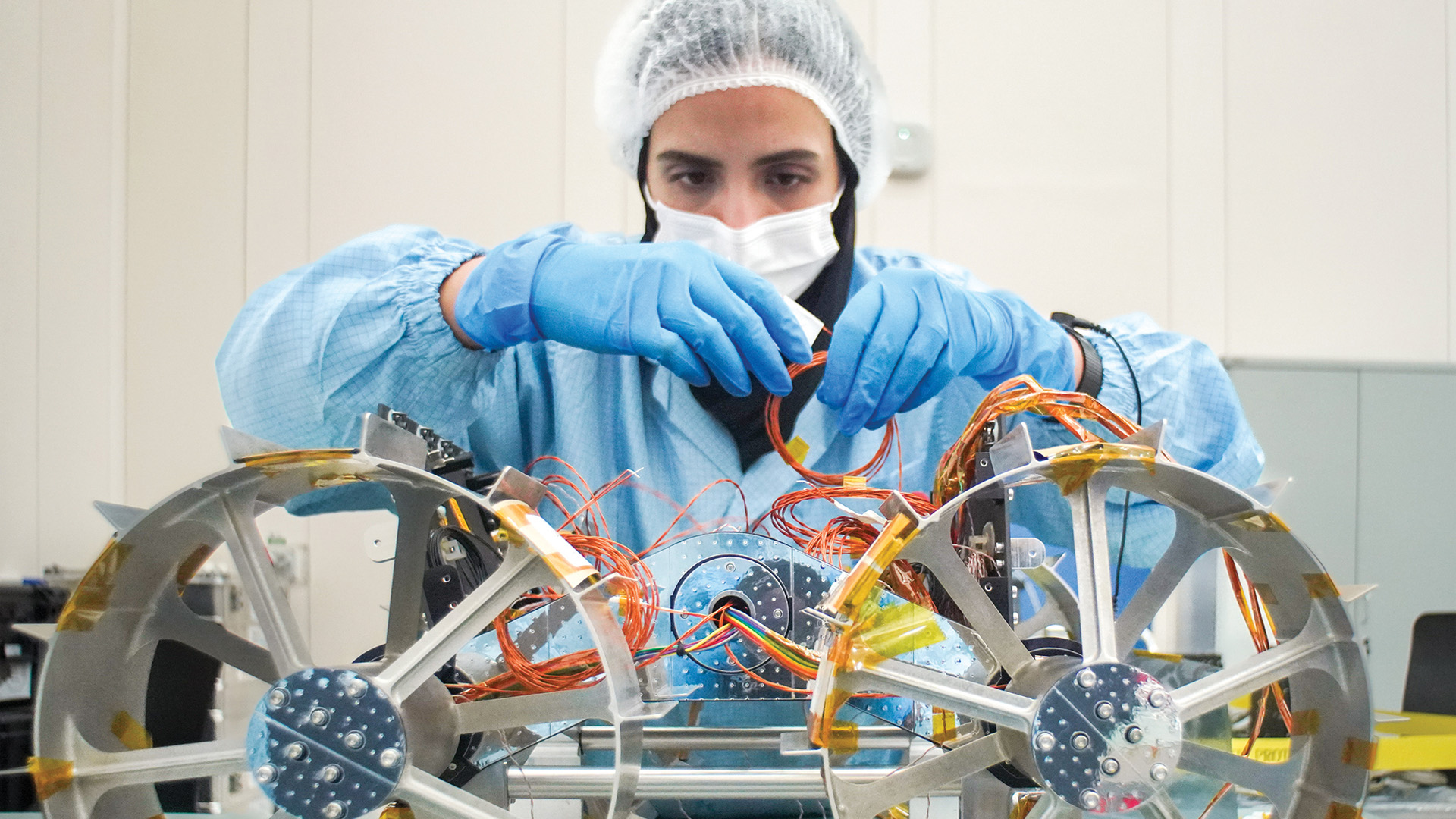Tech could someday let people even in dry climates
get clean water straight from the atmosphere›››
Her Excellency Sarah Al Amiri chairs the UAE Space Agency and is minister of state for Public Education and Future Technology. She recently answered KUST Review’s questions about how diversity strengthens her team, why a thriving space program benefits the nation and its people and more.
QUESTION: The UAE Space Agency is unusual in the tech industry for having a high percentage (50 percent) of female employees. The Mars Hope mission team you led was 80 percent women. How have you encouraged female participation and other forms of diversity in the workforce? Have you seen any positive effects on the work?
ANSWER: I’m immensely proud of the job we’ve done as an agency in removing barriers to entry for team members regardless of their age, nationality, gender or beliefs.
Since my childhood, I’ve always been very much deaf to challenges pertaining to gender, and this remains very much the case today. For me, it is less a question of gender and much more one of diversity.
The key to scientific achievement is to begin with interesting questions, and the driver of interesting questions is genuine variance in thought, perspective and experience – different people, from different backgrounds, with different ways of thinking. This has been integral to our achievements in recent years.
 CAPTION: Sarah Al Amiri
CAPTION: Sarah Al AmiriQ: How have the UAE’s space endeavors benefitted the country’s economy?
A: We have built the space sector directly into our nation’s economy and its plans for future growth. By fostering an environment which pushes the boundaries of technology and science in space, we can unlock the enormous economic potential of the sector.
From multinational businesses to start-ups to space entrepreneurs, we feel the UAE – through our technology, experience and capabilities – is the ideal place for private space companies. For us, as an agency, to keep innovating and progressing, it’s essential that we have a close, productive relationship with the private sector and wider space community.
As a tangible example of this, we recently announced the Emirates Mission to the Asteroid Belt, which will have a 50/50 split between public- and private-sector contribution to the mission.
Q: The asteroid-belt mission in 2028 will fly by Venus and survey seven asteroids. What do you hope to learn, and what are the biggest obstacles to success?
A: There is much to be learned from close inspection of this asteroid belt. Foremost, the mission will offer us greater insight into the origin of these asteroids, which in turn, could teach us much about the history of the universe and life itself.
By investigating the emergence of organic compounds on the asteroids, we can potentially better understand how water, and in turn life, came to be here on Earth.
The mission is, of course, immensely challenging from an engineering perspective, not least because it will span a distance more than 10 times that of our recent journey to Mars.
Q: The country clearly plans to be a leader in the space realm. How is the UAE encouraging the next generation of scientists?
We pride ourselves on our collaboration with other nations, space agencies and international companies, and recognize that the future of space is very much a global opportunity.
– Sarah Al Amiri
A: Inspiring the next generation of scientists, and technologists, here in the UAE is always front of mind for me and is a natural synergy between my roles at the Space Agency and as a minister for public education.
As an agency, we host a youth council which aims to empower and support talented young Emiratis with an interest in space, as well as to ensure their perspectives are shared with us.
We are also working closely with schools and universities throughout the Emirates to ensure STEM pathways are open to all.
The majority of the mission team for the Emirates Mars Mission was under the age of 35 – demonstrable proof that age is not a barrier here.
Q: International cooperation has been an important part of the UAE’s space endeavors. Its astronauts train with NASA in the United States and it has worked with other international partners for such missions as launching the Rashid rover to the moon. Do you plan to continue such partnerships or is the UAE interested in building the facilities to provide more of these functions at home?
A: We pride ourselves on our collaboration with other nations, space agencies and international companies, and recognize that the future of space is very much a global opportunity.
International partnerships are key, not only because of the potential to share capabilities, technologies and experiences, but also to shape governance from a regulatory and policy perspective. This is particularly important for sustainability, commerciality and the avoidance of conflict.
Moving forward, we very much look forward to forging new partnerships as well as convening established and emerging space powers to further drive cooperation.




